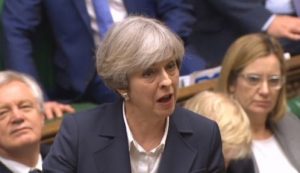
Theresa May has given it her best shot. It is hard to see anything else she could have done to make Brexit work. The game-changer of the last few weeks has been the sheer level of parliamentary dysfunction. It’s now clear that Brexit can’t happen on 29 March because of the sheer volume of legislation to be handled between then and now. If it can’t handle that, it has no chance of the sort of wise restructuring of our arrangements that would be needed for any form of Brexit to have even half a chance of working, and it has no chance of the tough decisions having widespread public support — particularly when they hit the jobs and prospects of people who voted Leave.
Under normal circumstances, when a government has lost credibility it would be time for a General Election. But right now, our two biggest parties are both deeply split. Neither can put forward a manifesto that’s more than an awkward compromise, so neither could form a credible government.
Retracting the Article 50 notice has to be done in good faith, so couldn’t retract it in March to re-issue it in May. But retracting it, and agreeing not to attempt another referendum for (say) five years, gives space for the country to stabilise.
Soon after the referendum, wrote something in which I argued that Europe has been the stable context against which British politics is defined for a very long time — so the European Union is only the latest chapter in that process. In voting to Leave, we’d attacked that containment, leaving our political system in spasm. The words have become ever more apt as we get closer to the scheduled date of of Brexit.
On top of this, we are placing a huge burden on our civil servants, the overwhelming majority of whom support continued EU membership. They have responded with characteristic professionalism, but it places a huge burden on dedicated people to ask them, day in, and day out, to make the best of a bad job. As things get more fevered, the risk of stress-induced mistakes goes up. This doesn’t help.
Personally, I think the cleanest solution is the present Liberal Democrat policy of a People’s Vote with the option to Remain. This should take place after the alleged criminal actions from the Leave campaign have been investigated properly, so the regulations can be changed both to avoid future infringements and to minimise interference on Twitter and Facebook from outside the UK. But we don’t have the luxury of the time this would take.
In the background we also have a problem with referenda. Normally we elect MPs to find out the facts, deliberate together, and come to a conclusion. We, the electorate, give them that authorisation. Holding a referendum is an admission that this is not working. David Cameron might well have called the 2016 referendum to silence his critics, but it also undermined the authority of parliament. Another referendum risks undermining things even further, by giving the impression that politicians can’t be trusted to come to wise decisions.
In the present state of crisis, we are heading rapidly to the point when the country needs Theresa May to show some wise leadership, admit that Brexit can’t be delivered, and retract the Article 50 notice. This is something that has to come from Theresa May. The reaction from some would test her leadership, but the test would be less cruel than attempting the impossible task of trying to deliver on the impossible promises of the Leave campaign.